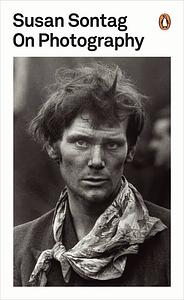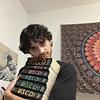You need to sign in or sign up before continuing.
Take a photo of a barcode or cover
informative
inspiring
reflective
fast-paced
Gave me a lot to think about in regards to how I live my daily life in the Image-World (which, needless to say, in the 50 years since these essays were written has become ever more dominated by photographic images). Also led to some interesting screenplay ideas. I like Susan Sontag’s writing style: straight to the point, nuanced and convincing.
challenging
reflective
tense
slow-paced
This was a brilliant book in many ways. I didn't enjoy it as much as I might have because I really didn't agree with Sontag on a number of points. She compares photography a number of times to rape and cultural appropriation. I think such comparisons are overblown and I had a hard time with the argument because of it. She is also vehement in her criticisms of the activity of photographing and never points out an instance where creating photographic images is a worth while pursuit. I found her attack on photography a bit unbalanced and perhaps unfair.
At the same time Sontag has produced a fascinating history of photography and has explored in detail what it means to live in an image saturated world. She makes some fascinating arguments about how the constant bombardment of images changes the way we view reality. This is well worth a read for anyone with any interest in photography as well as anyone interested in advertising, photo-journalism, or historical photos.
This book was written in the 70s but is still completely relevant even though photo technology has changed. In fact, it's creepily prophetic in places. Sontag anticipates how images will continue to infiltrate our lives and change the way we see the world.
At the same time Sontag has produced a fascinating history of photography and has explored in detail what it means to live in an image saturated world. She makes some fascinating arguments about how the constant bombardment of images changes the way we view reality. This is well worth a read for anyone with any interest in photography as well as anyone interested in advertising, photo-journalism, or historical photos.
This book was written in the 70s but is still completely relevant even though photo technology has changed. In fact, it's creepily prophetic in places. Sontag anticipates how images will continue to infiltrate our lives and change the way we see the world.
informative
slow-paced
I’ve been meaning to read this for awhile. Though it’s outdated in terms of the technology of photography, it is extremely relevant for a world that has continued to trend deeper and deeper into image obsessiveness. I learned a lot about photography and its role in art, consumerism, and capitalism.
Like the best philosophy I think Sontag is wrong about a lot of things - like about photographing something being an act of non-intervention, or about photography being a more complete method of appropriation and control than writing - but she is frequently right too and either way her claims are interesting. As a work of philosophy, On Photography successfully made me consider (among other things) the existential implications of a post-photo world and the way in which images are substituted for knowledge.
I realized that in my dreams, I will often watch an interaction between two people and it will take the form of a movie or TV show. In my dream journal I will say, I was watching a movie about these women. In these instances I am seeing the image of them represented in my dream through a mechanical process that I encounter frequently in waking life. Before the image, this wouldn’t have been framed in this way. Image have invaded my subconscious, to the point where I can’t look into another world without contextualizing it as filmic. It’s only thanks to Sontag that I am starting to think about the shift to capturing images as an epistemological leap on par with the development of writing.
Very western, and with its own prejudices and blind spots (for example, the comparison between photography and western painting tradition is sometimes interesting but generally quite stunted). Overall though this is a compelling work about seeing which blows amateur cultural analyses like John Berger’s Ways of Seeing out of the water. It made me wonder what I have never seen photographed, and what I do or do not think exists as a result. Now when I see past what I usually see to whatever is beyond it, I understand that this is a momentary bolt of clarity before the frame clicks back into place.
informative
medium-paced
challenging
informative
medium-paced
Many notable photographers mentioned that I will do research on later. I feel that I will revisit this book a second time. Sontag makes sweeping generalizations as many reviewers have mentioned, whilst posing interesting ideas and deliberations about the state of photography. Some of them contradict one another, going back and forth between points; she seems knowledgeable - but also her takes on the subject brings about an air of “THIS is what photography is” that sometimes is hard to follow. I think that the biggest take away I got from this is looking up new artists (to me) to research, along with highly-regarded photographers throughout history to call back upon. A bit dense and she approaches the reader with kind of a pompous attitude, which is surprising to me as a first time reader of her work because she always seems to be regarded as a prolific writer. At least she’s a woman that’s respected writing about a field where men are usually the only ones recognized!
reflective
slow-paced




